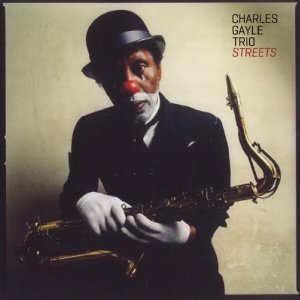
Charles Gayle Trio: Streets (Northern Spy)
There was a time, two decades ago, when a dedicated cult regularly went to the old Knitting Factory (on Houston Street, when it was still mostly a jazz club) on Mondays, because for months at a time the club would have Charles Gayle play two sets every Monday night. If you were a fan of hardcore free jazz, that was THE regular gig in New York in the early '90s.
Born in Buffalo in 1939, Gayle had hit New York City by the early '70s. He almost made his mark with an album on venerable avant-garde label ESP-Disk in 1974, but the label shut down before it came out (revived last decade, it once again has plans to release that album -- keep your fingers crossed!).
When he next recorded in 1988, he had been homeless for a while, sheltering in an empty Brooklyn storefront. The Knitting Factory gigs and concurrent CDs from Swedish imprint Silkheart, the Knit's own house label, the Italian label Black Saint, and a particularly well-received-in-Europe album on FMP (that was reissued last year), Touchin' on Trane, all boosted his profile and to a lesser extent his finances, he moved up to an East Village squat, then finally a small apartment. Further fame came when he collaborated with Henry Rollins in the mid-'90s, and the European festival circuit helped as well.
What captivated avant-garde jazz fans and appealed across genre boundaries was the unfettered energy of Gayle's tenor saxophone playing. Usually playing in a pure free-improvisation format, he would power through lengthy solos, honking and squealing, without letting the fires damp for even an instant, perfecting an organically flowing style that mixed complementary unfoldings of cellular motifs with startling contrasts, his imagination overflowing his horn as he opened a window into a musical universe of absolute freedom communicated only by the most spontaneous and gifted performers: predecessors John Coltrane, Albert Ayler, Frank Wright, and Pharoah Sanders, Gayle and his contemporary Peter Brötzmann, and the next generation's David S. Ware.
As regrettable as it is that Gayle went undocumented for 15 years between his ESP false start and his first sessions for Silkheart in '88, he has made up for lost time ever since. This is Gayle's 31st released album (if one counts him as co-leader on the albums with Rashied Ali, which pretty much everyone does) in 24 years -- and that's even with a relatively fallow period in the previous half-decade (just three albums of new material in 2007-11). He went through some changes after 2003, switching to alto sax and emphasizing a cleaner, more agile, and slightly more traditionally based style, including such bebop standards as "Cherokee." But for this week's new release Streets (named for the mimed sad-clown character he occasionally incorporates into his performances) he has returned to tenor, and plays with the same freedom and inspiration -- and nearly as much weight and fire -- as in the old days. (Is it greedy to hope that next time out, he brings his bass clarinet as well?)
As he so often has, Gayle works here in a trio setting, now with Larry Roland on bass and Michael TA Thompson on drums. While Roland is not riveting in his solos, both members of the rhythm section support Gayle well, spurring him on with the thick, busy background he seems to prefer when playing tenor sax, but also providing enough variety of timbre and density to keep things from blurring together. Gayle rarely unleashes his full ferocity in the studio -- even the studio sessions from his peak period of the '90s are slightly tame compared to the concert recordings -- but this is still wild and unfettered compared to the vast majority of sax jazz you'll hear nowadays, and (along with the somewhat differently focused David S. Ware) as close as you can get in person to the glory days of free jazz.
